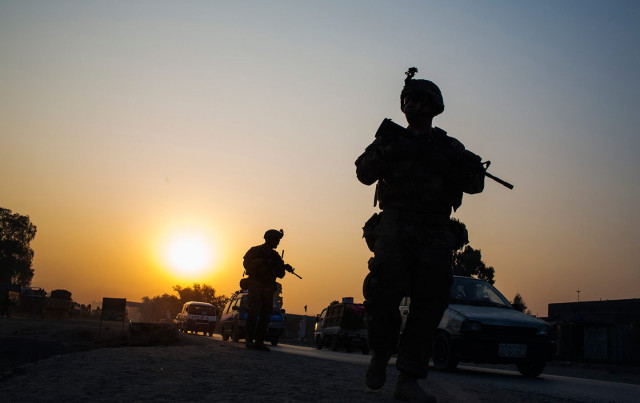Chasing peace in Afghanistan
The question is: can the renewed push for a peace deal succeed

PHOTO: REUTERS
In the last week of August, the US and the Taliban had, in principle, agreed to sign the deal. The draft agreement was prepared after nearly a year-long painstaking talks between the two sides. Pakistan has played a key role in these negotiations. In fact, its decision to release Baradar, the co-founder of the Taliban movement, was instrumental in taking the peace process forward. The draft agreement envisaged a timeline for the withdrawal of US troops from Afghanistan. The US agreed to pull out 14,000 troops that are currently stationed in Afghanistan in 16 months’ time, while 5,000 of them would return home in 135 days from the day of signing the agreement. In return for this roadmap, the Taliban gave firm assurances that they would not allow the Afghan soil to be used again by any terrorist group such as Al Qaeda. Everything was set for the signing of what would have been a landmark deal after nearly two decades of bloodshed in Afghanistan. President Trump wanted to make it a world spectacle as he invited the Taliban delegation and Afghan President Ghani to Camp David. The extraordinary event was to take place just before the anniversary of the 9/11 attacks. But, as Ghani and the Taliban delegation were about to fly to Washington, Trump took to Twitter and cancelled the peace deal with the Taliban as well as what would have been a secret meeting with them.
The reason, he cited, for walking away from the peace talks at the last minute was the Taliban’s continued attacks targeting American soldiers. However, the real reason was something else. Trump faced stiff opposition from within his administration over agreeing to a deal that offered little concessions to the US and the Afghan government. John Bolton, the then national security adviser, was lobbying against the deal. Other administration officials were also skeptical. Hence, Trump had to call off the deal and talks with the Taliban. But when Bolton was sacked within days after his opposition to the peace deal, it was evident that Trump still favoured the peace agreement with the Taliban. However, this time, he wanted to make sure that the Taliban agreed to a ceasefire and intra-Afghan dialogue. There are a couple of reasons for the emphasis on the ceasefire: one, to create a favourable environment for a peace deal; and two, to assess if Taliban leaders or those holding talks indeed exercise authority over their foot soldiers.
The question is: can the renewed push for a peace deal succeed? The sense in Islamabad is that there is a possibility of a framework agreement between the US and the Taliban. But the real challenge would be to implement those decisions and that’s where the actual success or failure of a possible deal lies.
Published in The Express Tribune, December 9th, 2019.
Like Opinion & Editorial on Facebook, follow @ETOpEd on Twitter to receive all updates on all our daily pieces.














COMMENTS
Comments are moderated and generally will be posted if they are on-topic and not abusive.
For more information, please see our Comments FAQ